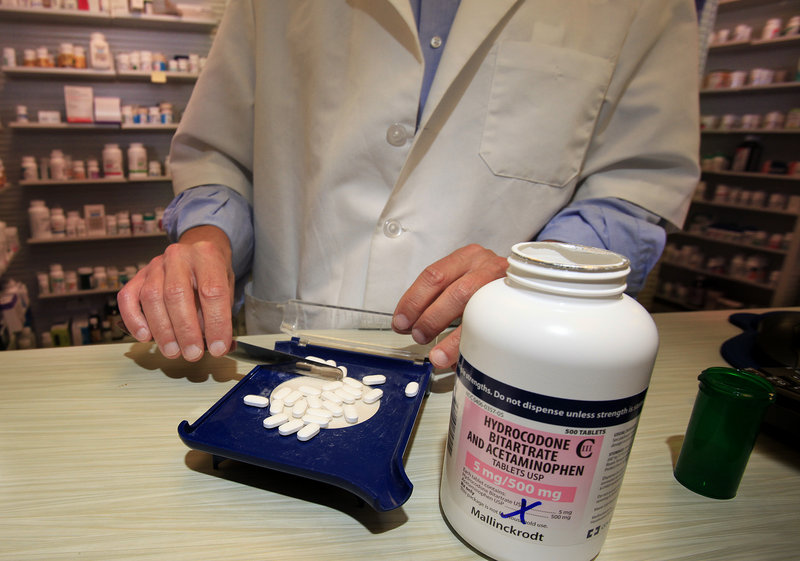The timing was fortunate, if mostly coincidental. Within days of the final installment of MaineToday Media’s six-part series on the state’s problems with prescription drug abuse, Attorney General William Schneider announced plans for a task force to address the issue.
Schneider’s announcement was welcome news, and we’re not saying that just because our reporter John Richardson called attention to the problem in last week’s series, “Painkillers in Maine: A Cure With a Curse.” The widespread abuse of prescription drugs is a deadly problem, in Maine and elsewhere, and the attorney general is to be commended for taking steps to deal with it.
Gov. LePage likewise merits praise for acknowledging the problem and pledging his support for corrective action.
LePage made the commitment Tuesday during a daylong “summit” convened by Schneider to collect ideas and recommendations from a variety of sources, including government officials and law enforcement personnel as well as doctors and other representatives of the medical community.
The conference had been in the works for months, so we’re not trying to steal the limelight from Schneider and LePage; we would like to think, however, that our timely series helped heighten public awareness of the problem and perhaps helped set the stage to generate some momentum for the state’s efforts to deal with it.
Schneider revealed the task-force initiative at the end of the summit, saying the group will focus on implementing ideas produced by conference participants.
Among the recommendations: an informational campaign to educate the public about the dangers of abusing prescription drugs, and developing a system that will enable law enforcement and the medical community to share information.
The governor’s comments came during the meeting and established a determined tone for the task ahead.
“We need you all to participate,” LePage told the conference attendees. “I’ll be there, and whatever I need to do to help you, you let me know.… We need to get these drugs out of the hands of the wrong people. Those who have addictions, we need to treat them.”
The reference to treatment was significant because it’s an absolutely critical component of any effort to confront the prescription drug problem.
It’s one thing to crack down on individuals who “doctor shop” to acquire drugs for themselves or others and on black-market dealers who traffic in addicts’ misery.
Criminal penalties for those who break the law should be swift and stringent.
But countless numbers of those affected by this problem are victims, people with legitimate medical conditions who need help managing pain or other symptoms and gradually, unintentionally, drift into the nightmare of addiction.
These drugs are powerful, and too often those who take them lack the necessary information and supervision to use them correctly.
Some people may be predisposed to dependency without even knowing it and quickly find themselves in trouble. If they end up breaking the law, prosecution and punishment is called for – but at some point their addiction must be treated, not only for the addicts’ sake but for the long-term health of society. An endless cycle of addiction and crime threatens the well-being of everyone and benefits no one.
These are difficult times for advocates of social programs of any kind, even those that are inextricably linked to law enforcement.
State, federal and local money for treatment programs is scarce and will become increasingly hard to come by as government at every level scours budgets for potential reductions in spending. The same governor who voiced his support for drug treatment on Tuesday, for example, is hoping to slash as much as $25 million from Maine’s budget next year.
The horrible toll prescription drug abuse takes on addicts, their families and society was well-documented in Richardson’s series and thoughtfully discussed during the attorney general’s summit conference.
It is not a problem that can be ignored, or put off, or downplayed. The state’s top officials have said they are determined to solve the problem; the state’s taxpayers must be determined as well.
The solution will undoubtedly be expensive, but the cost of doing nothing will be much, much greater.
Send questions/comments to the editors.



Success. Please wait for the page to reload. If the page does not reload within 5 seconds, please refresh the page.
Enter your email and password to access comments.
Hi, to comment on stories you must . This profile is in addition to your subscription and website login.
Already have a commenting profile? .
Invalid username/password.
Please check your email to confirm and complete your registration.
Only subscribers are eligible to post comments. Please subscribe or login first for digital access. Here’s why.
Use the form below to reset your password. When you've submitted your account email, we will send an email with a reset code.